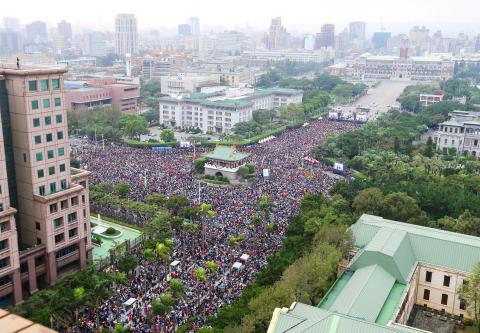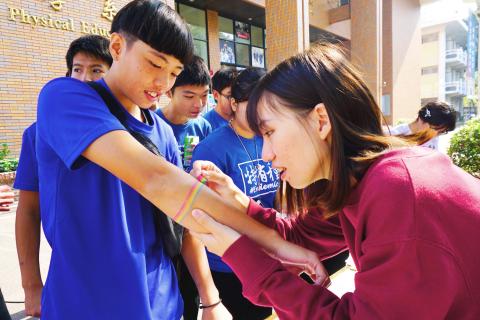More than 200,000 people yesterday gathered for a public concert on Ketagalan Boulevard in Taipei in support of same-sex marriage.
The concert, which had a theme of supporting equal marriage rights and preventing deaths caused by discrimination against gay people, coincided with Human Rights Day, the concert’s organizers said.
More than 20 artists took to the stage to express solidarity with supporters of same-sex marriage, including Hong Kong musician and pro-democracy advocate Denise Ho (何韻詩).

Photo: AP/Chiang Ying-ying
TV host Belle Yu (于美人) made an appearance onstage and tossed a bouquet to the crowd and wished gay couples luck in their bid to become legally united, while singers Kenji Wu (吳克群) and Aaron Yan (炎亞綸) joined the crowd to show their support.
Shortly after the event began, organizers flew a large rainbow flag made of balloons in front of the Presidential Office Building as a message to President Tsai Ing-wen (蔡英文) regarding the public’s demand to legalize same-sex marriage.
Legislators across party lines attended the event to show their support, while participants holding up fliers and flowers chanted: “No Civil Code amendments, no end to discrimination.”

Photo: CNA
The organizers said that the crowd started to gather at 1pm and reached at least 200,000 people at about 4pm, spanning 4km.
The crowd cheered when Democratic Progressive Party (DPP) Legislator Yu Mei-nu (尤美女), who in October proposed the bill to amend the Civil Code, took to the stage to make a speech.
Same-sex marriage is a lofty dream, Yu said, adding that the ongoing legislative process is like mountaineering: The peak is in sight, but it does not always mean the road ahead will be easy.

Photo: Wang Yi-sung, Taipei Times
Yu said that she and her colleagues at the legislature’s Judiciary and Organic Laws and Statutes Committee would clear committee reviews of three draft bills aimed at legalizing same-sex marriage, which are scheduled for Dec. 26.
However, as the end of the legislative session nears, a bill might not be passed until June, following cross-caucus negotiations, she said, urging the public to use this time to engage in rational discussions on gay marriage.
All five members of the New Power Party (NPP) legislative caucus also attended the event to show their support.

Photo: Tsai Shu-yuan, Taipei Times
Love is what unites all the participants at the event and NPP legislators are just like any other people in the crowd who want equal marriage rights, justice and love, NPP Executive Chairman Huang Kuo-chang (黃國昌) said.
“I believe that we will succeed if we continue on this path,” he said.
Chinese Nationalist Party (KMT) legislators Ko Chih-en (柯志恩), Chiang Wan-an (蔣萬安) and Jason Hsu (許毓仁) also voiced their support for same-sex marriage in pre-recorded videos, with Chiang and Hsu saying they are in favor of amending the Civil Code.
Presidential Office spokesman Alex Huang (黃重諺) said that Tsai supports marriage equality and believes that gay people have the right to marriage.
“With regard to the draft bills, they are being discussed in the legislature. We welcome and look forward to more dialogue and a higher level of tolerance in society to better safeguard the rights of gay people,” Alex Huang said.

MORE VISITORS: The Tourism Administration said that it is seeing positive prospects in its efforts to expand the tourism market in North America and Europe Taiwan has been ranked as the cheapest place in the world to travel to this year, based on a list recommended by NerdWallet. The San Francisco-based personal finance company said that Taiwan topped the list of 16 nations it chose for budget travelers because US tourists do not need visas and travelers can easily have a good meal for less than US$10. A bus ride in Taipei costs just under US$0.50, while subway rides start at US$0.60, the firm said, adding that public transportation in Taiwan is easy to navigate. The firm also called Taiwan a “food lover’s paradise,” citing inexpensive breakfast stalls

TRADE: A mandatory declaration of origin for manufactured goods bound for the US is to take effect on May 7 to block China from exploiting Taiwan’s trade channels All products manufactured in Taiwan and exported to the US must include a signed declaration of origin starting on May 7, the Bureau of Foreign Trade announced yesterday. US President Donald Trump on April 2 imposed a 32 percent tariff on imports from Taiwan, but one week later announced a 90-day pause on its implementation. However, a universal 10 percent tariff was immediately applied to most imports from around the world. On April 12, the Trump administration further exempted computers, smartphones and semiconductors from the new tariffs. In response, President William Lai’s (賴清德) administration has introduced a series of countermeasures to support affected

CROSS-STRAIT: The vast majority of Taiwanese support maintaining the ‘status quo,’ while concern is rising about Beijing’s influence operations More than eight out of 10 Taiwanese reject Beijing’s “one country, two systems” framework for cross-strait relations, according to a survey released by the Mainland Affairs Council (MAC) on Thursday. The MAC’s latest quarterly survey found that 84.4 percent of respondents opposed Beijing’s “one country, two systems” formula for handling cross-strait relations — a figure consistent with past polling. Over the past three years, opposition to the framework has remained high, ranging from a low of 83.6 percent in April 2023 to a peak of 89.6 percent in April last year. In the most recent poll, 82.5 percent also rejected China’s

PLUGGING HOLES: The amendments would bring the legislation in line with systems found in other countries such as Japan and the US, Legislator Chen Kuan-ting said Democratic Progressive Party (DPP) Legislator Chen Kuan-ting (陳冠廷) has proposed amending national security legislation amid a spate of espionage cases. Potential gaps in security vetting procedures for personnel with access to sensitive information prompted him to propose the amendments, which would introduce changes to Article 14 of the Classified National Security Information Protection Act (國家機密保護法), Chen said yesterday. The proposal, which aims to enhance interagency vetting procedures and reduce the risk of classified information leaks, would establish a comprehensive security clearance system in Taiwan, he said. The amendment would require character and loyalty checks for civil servants and intelligence personnel prior to